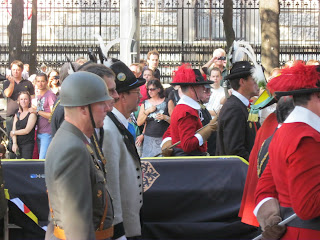The old Habsburg banner

A red-plumed guard of honour from England

The 21 gun salute
 Yesterday I was amongst the thousands of residents and visitors lining the route of the kilometer long funeral procession of the man they call the last Emperor of Austria.
Yesterday I was amongst the thousands of residents and visitors lining the route of the kilometer long funeral procession of the man they call the last Emperor of Austria. Otto von Habsburg was never an Austrian emperor, except in many people's hearts. The family were banished from their homeland after the first World War and the Deutsch-Östereich Republic (the Republic of German Austria) was proclaimed. Habsburg property was confiscated and the family was deported on a British Naval ship to the Portuguese island of Madeira. And it was there that the young Otto, at the age of 9, witnessed his father's death. The last emperor, Emperor Karl, was a victim of the Spanish flu pandemic.
The Deutsch-Östereich Republic soon degenerated into an Austro-Facist State modeled on Mussolini's Italian version. A self-exiled young man called Adolf Hitler, who had served as a runner in France during the first World War was meanwhile busily writing Mein Kampf (My Struggle). It was a book that Otto von Habsburg read closely. And having read it he observed that the author, an avid reader of Karl May cowboy books, had a struggle, amongst other things, with the German language.
Otto von Habsburg saw great and dangerous predictions within the pages of Mein Kampf. He saw the danger to Austria and tried to organize a resistance movement.
The Germans crossed into Austria over the River Danube at Passau, a small town where Hitler's father had served as a customs official. There was no attempt on the Austrian side to make even a token gesture of defiance such as blowing up the bridge at Passau.
The invasion of Austria was codenamed Operation Otto. The man after whom it was named was placed on a Nazi Death List. He made his way to Paris and organized a resistance from there.
In 1942 when Hitler's Nazis stood at the gates of Paris, Otto von Habsburg fled to the USA and continued to rally support. He had many meetings with President Roosevelt and was an admirer of Winston Churchill. He also travelled to many countries and obtained thousands of visas for fleeing Austrians.
When the inhabitants of the newly created Ostmark woke up to reality they discovered that the Austrian National Bank had been plundered of its gold, that their land was a land of Nazi Death Camps and that their finest young men were in German uniform and marching to certain death in the East. It was the nightmare scenario predicted by Otto von Habsburg.
During the Cold War Otto von Habsburg was one of the main organizers of the so-called Sopron Picnic - an event which enabled hundreds of East Germans crossed the Hungarian border into Austria. It was an event which would lead to the fall of the Berlin Wall.
Otto von Habsburg was also an important and influential European and a longtime prominent member of the European Parliament. It was therefore most fitting that they came in large numbers from the old lands of the Habsburg Monarchy - Bohemia, Moravia etc., - what many people today call the first European Union - to Vienna. In their national costumes they were at the requiem and in the funeral procession.
I shall always remember and treasure my memories of Otto von Habsburg whom I met at a book presentation in 2008. I found him to be a man of qualities. He was charming, perceptive, and intelligent. There was nothing two-edged or fuzzy about him. We spoke on equal terms - one to the other. Here, I felt, was a man you could trust.
His family can be proud of him.
Watched this event on the news here yesterday. This man lived through so many events and what a link to the past.
ReplyDeleteIt must have been quite an experience for you both yesterday and the 2008 book event.
I read that he had died Gwilym. They really don't make them like that any more.
ReplyDeleteYes, Gordon - two red letter days.
ReplyDeleteHi Pat, the end of an era. Look around - you may be right.
And his heart is buried in Hungary?
ReplyDeleteYes, that's right. It's a family tradition to have bits and pieces buried in different places. The Hungarians will like this because of the Sopron Picnic event to open the Iron Curtain that he was involved in.
ReplyDelete